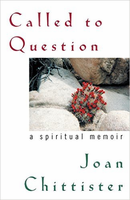What Is Faith?
The problem of the nature of faith plagues us all our lives. Is openness to other ideas infidelity, or is it the beginning of spiritual maturity? What is it that can possibly take us so far afield from the initial believing self? How do we explain to ourselves the journey of getting from there to here, from unquestioning adherence to institutional answers, to the point of asking faithful questions? It took years before I realized that maybe it is belief itself, if it is real, that carries us there. Maybe if we really believe about God what we say we believe, there comes a time when we have to go beyond the parochialisms of law. Maybe, if we are to be really spiritual people, we can’t afford the mind-binding of denominationalism. In order to find the God of life in all life, maybe we have to be willing to open ourselves to the part of it that lies outside the circles of our tiny little worlds.
How do we explain to ourselves the journey of getting from there to here, from unquestioning adherence to institutional answers, to the point of asking faithful questions? It took years before I realized that maybe it is belief itself, if it is real, that carries us there. Maybe if we really believe about God what we say we believe, there comes a time when we have to go beyond the parochialisms of law. Maybe, if we are to be really spiritual people, we can’t afford the mind-binding of denominationalism. In order to find the God of life in all life, maybe we have to be willing to open ourselves to the part of it that lies outside the circles of our tiny little worlds.
The Sufi tell of disciples who, when the death of their master was clearly imminent, became totally bereft. “If you leave us, Master,” they pleaded, “how will we know what to do?” And the master replied, “I am nothing but a finger pointing at the moon. Perhaps when I am gone you will see the moon.” The meaning is clear: It is God that religion must be about, not itself. When religion makes itself God, it ceases to be religion.
But when religion becomes the bridge that leads to God, it stretches us to live to the limits of human possibility. It requires us to be everything we can possibly be: kind, generous, honest, loving, compassionate, just. It defines the standards of the human condition. It sets the parameters within which we direct our institutions. It provides the basis for the ethics that guide our human relationships. It sets out to enable us to be fully human, human beings.
—from Called to Question by Joan Chittister (Sheed & Ward)
